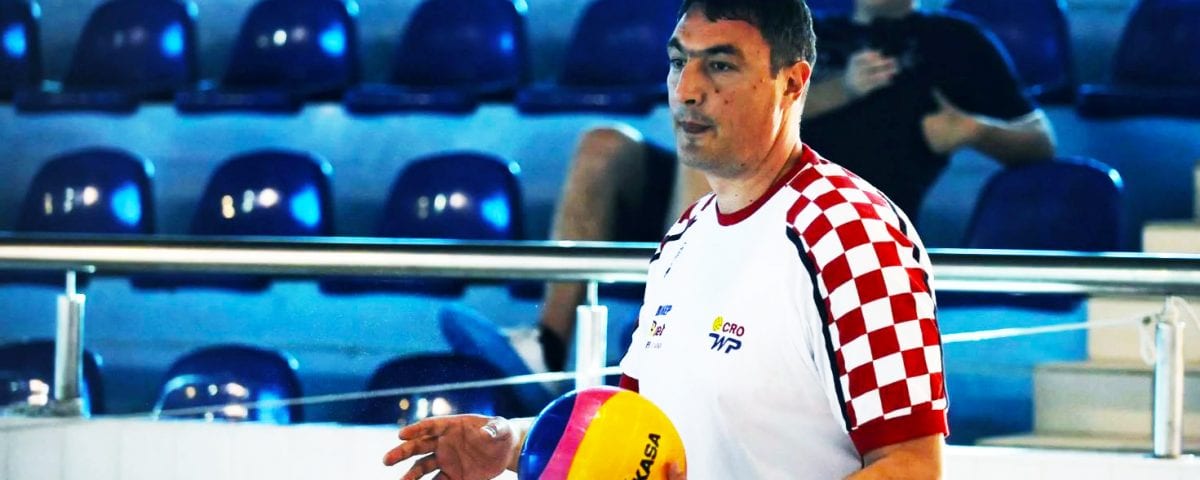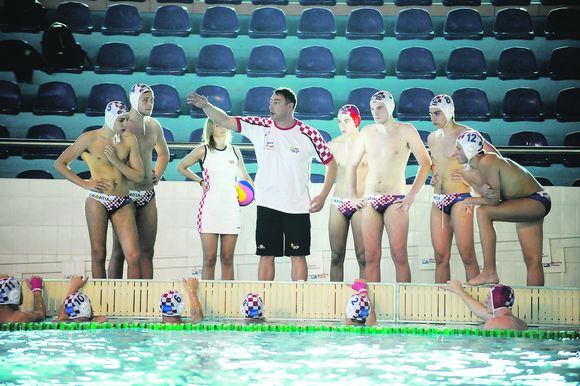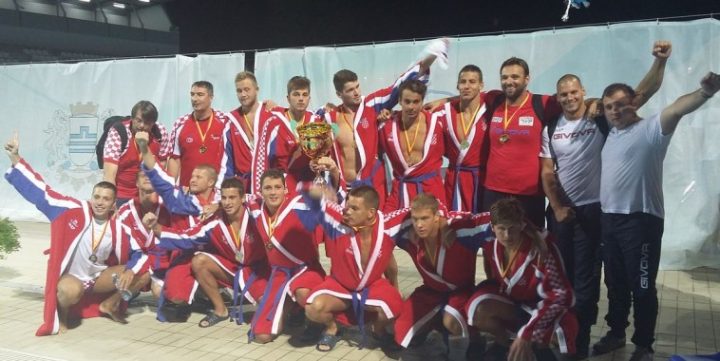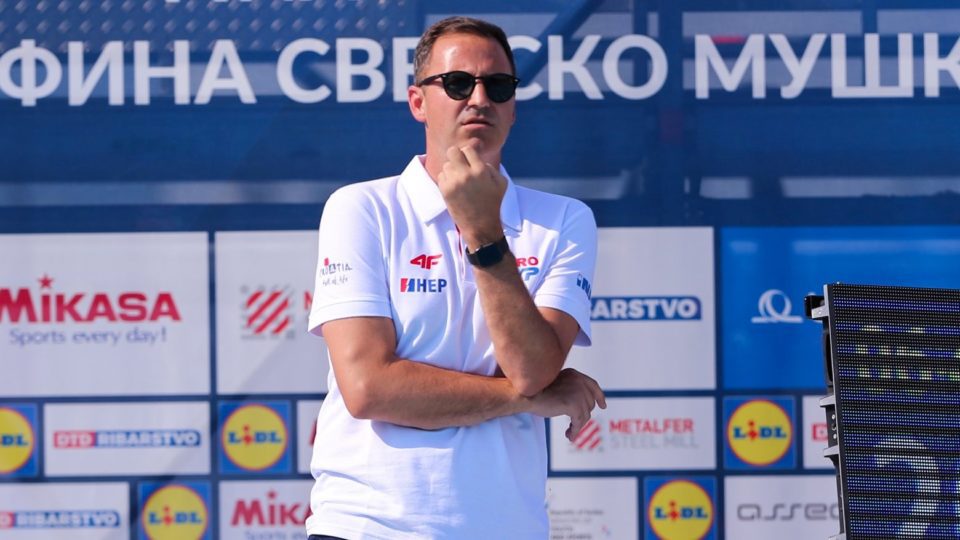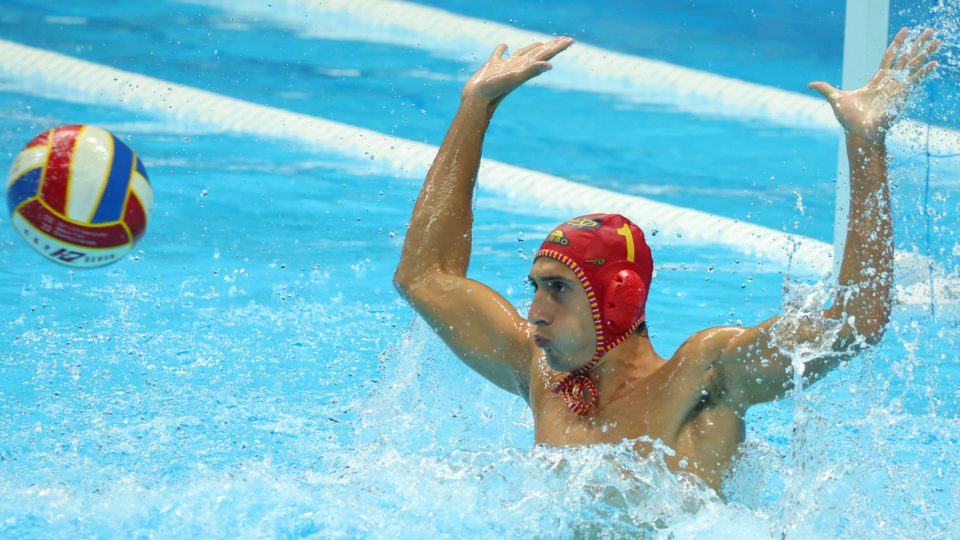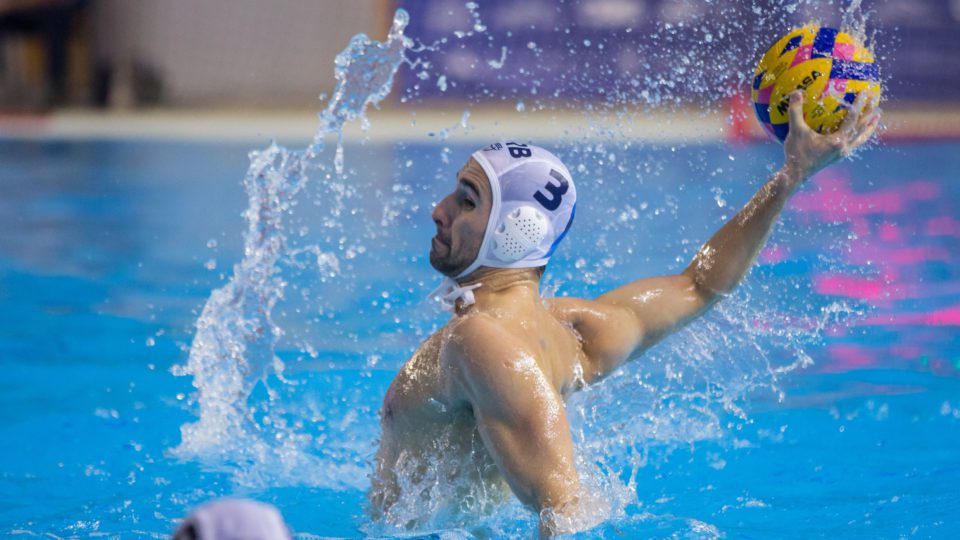Following his new position in Solaris, we talked to Joško Kreković. He’s a former Croatian player and Olimpic silver medalist, double Champions League winner and a life-long water polo enthusiasts. He’s been a coach for some time and is currently the world champion with U-18 in Podgorica (Montenegro). He has a lot to say about the sport itself, especially in the spheres of younger generations. Read the interview below!
About Joško Kreković
How and where did you start with water polo? Can you tell us something about your career?
I started my player career in VK Mornar-Split, where my father was a coach. Today, I find it quite interesting since my son is now playing in the same club. You could say that our family has a tradition in VK Mornar.
Back in my career, after I left VK Mornar, I played in three more clubs in Split (Croatia). With VK Mornar, I won the LEN Cup Winners’ Cup. Later, I won two Champion Leagues with VK Jadran-Split. I joined VK POŠK-Split after their big success in the Champions League and spent a year playing for them.
In the meantime, I played in Pescara with whom I took part in another LEN Cup Winners’ Cup. That year, VK Jug won.
After that, I went to Nervi in Italy where I played for three years before I came back to VK Mornar where I spent three more seasons playing before I took over the first team and led it for six years.
I’ll never forget how much has VK Mornar done for me and my career and I’ll be thankful for the rest of my life.
As a player, how would you compare the water polo that was played back then, compared to today?
That’s absolutely incomparable. Water polo has evolved drastically.
Back then, we played differently. As we look on the recordings from the old days, we notice that in defense it was a dead zone where goalies were lined up in front of a firing squad. It was a lot easier to attack. Seeing it that way, I’d say that the “old-school” players wouldn’t be of any use in today’s water polo.
Rules and Changes
What’s your opinion on this new initiative to change the rules, and on the rules in general?
To answer this, I’d like to go back to the comparison between old and new water polo. When we talk about rules regulations, changes, and adaptations, it’s problematic to see that the rules changed little and the game changed a lot. If we talk about fouls and exclusions in the rule book, almost nothing has changed.
These two were the same back then, and are the same now. Since then, the only thing that’s changing is the directives and criteria which are being changed by people around water polo, and not in it. This is where I think it went wrong.
Before, it was impossible for a player to play defense in a vertical position — if someone even put a hand on him, an exclusion would be called. Today, though, players are holding each other with both hands, preventing any kind of movement, which is a big change. The problem lies in the fact that these aren’t the rules changes, they’re only “tips” or “instructions” the referees are given and they are referring according to this.
My teams always play with a lot of entries and swimming around. And that’s one of the problems too. How can an outer player, who is sometimes lighter than his opponent, slip pass the opponent if he’s being held with both hands?
On one occasion, we discussed changing the rules. I suggested we bring referees and delegates into the discussion table because they are the ones who dictate the criteria, and are letting the players do things like that.
A few years ago, in the national league, we decided that such actions would be sanctioned. But after two or three matches we quiet because there were too many players being excluded from the game. The biggest problems were the wings and other “non-dangerous” positions.
But then I wonder. Why are those players being held with two hands if they’re not dangerous and why this shouldn’t be sanctioned?
I assure you that coaches and players will adapt very quickly to every new criterion!
Part of the problem definitely lies in the referees, if not the delegates too, because they are the ones determining the criteria. Until we don’t stop changing criteria every season before important tournaments (Olympics, European and World Championships) or national leagues, there is no point in thinking about new rules.
Considering the new suggestions, I think they won’t help a lot until players are allowed to move around the pool.
I must point out that I’m against changing the core of water polo. For example, I’d like to say something about the last U-18 Championship in Podgorica where teams played 5v5. Thankfully this idea was abandoned later on.
Every other sport works on its issues. In basketball, the game was fastened with crossing the center, in handball, there are a goalkeeper-player situation and fast center, in football, they prohibited the goalkeeper from catching a returned ball with his hands.
And what have we done? We kicked out one player. By doing this, water polo became another sport. These are the things we don’t want to play with because this sport needs to stay the same in its core.
We can move the line from 5 to 6 meters, we can let the goalkeeper cross the center, allow a shot from the corner, change the way penalties are executed, etc. But to meddle with the player numbers, decrease the ball size, or increase the goal size, that’s wrong.
A match that ends with the score of 25-22 is not an interesting match. Sure, there were suggestions such as “quick center” to reduce the time lost in transitions. But the question is: who will endure that? Water polo players swim, their movement is limited.
These are the real problems we don’t see while we discuss reducing player numbers, lowering the time between the quarters, and reducing time-outs.
Coaching Younger Generations
Let’s talk about coaching some more. What is the most efficient way of moving a junior player into a senior team?
I think it only depends on the main coach in the team and the club’s policy. But it surely requires a lot of courage from the coach. I know that because we were all young players once and we became successful because we got that few minutes in the pool, instead of sitting on the bench. You can’t learn to play water polo while sitting on the bench.
I became a good player that way too. If my former coach Matutinovic wasn’t brave enough to send me into play, who knows if I’d be here today. He had a vision and wasn’t afraid of letting a 16-year-old in the game in crucial moments. This happened in the finals of the LEN Cup Winner’ Cup when VK Mornar played Pescara and won it.
For example, what happened in the finals of the Championship when Pescara played. The problem is that I’m rarely seeing it happen these days. In Croatia, the only man who’s still being brave enough to do it is Vjekoslav Kobescak from VK Jug.
What do you think about the calendar, the timing of competitions for clubs and national teams?
The calendar of competitions is a big issue. And not only for the senior clubs and national teams, but for younger players as well. Since I’m currently working with younger generations, I’ll talk about that part.
This is a problem LEN and FINA have to work together because their constant arguing hurts the sport. I cannot understand how every two years the European and World Championships for U-18 and U-19 take place in an interval of 15-20 days. Everyone knows that U-19 teams are joining the players of U-18, and vice versa.
Two years ago, I was the world champion with my U-18 team. While we were returning home, some of the players went to play with the U-19 team. Of course, they didn’t achieve what they wanted to because they were too tired to play again and they were not able to keep concentration that long, as their form went down. The same could happen to my U-19 team on the next European Championship because the U-18 one is taking place only 15 days before.
While I’m preparing with U-19, I already know I’d have to take a few players from U-18. But what I don’t know is in what state will these players be, when they join me, form-wise and possibly with an injury or two.
Not to mention they’ll arrive only four days before the Championship. From my experience, I know I won’t be able to take 5-6 players as I intended to. I’ll have to settle for taking 2-3 players.
FINA and LEN are the ones responsible for this and they have to think about it and adjust their calendars.
The worst thing is that there are national teams which use the same players for U-18 and U-19. And this decision hurt them even more.
These competitions have to separate. Ideally, if not by a year, at least a few months. For example, one at the beginning of the summer, and the other at its end.
Furthermore, the problem deepens when we count national championships in because they also have to adapt. Ultimately, the calendar is a big problem on the national and international level and we have to think about that.
I’m mainly talking about younger generations who even have more problems than this. We have to keep in mind that these players have other responsibilities like school, etc. — they are not professionals.
In addition, it’s not the same to train with juniors as it is with seniors. Young players cannot have two high-points in their form while playing two championships in one month. Every coach has to think about this.
And here I’m not even talking about the health of those players.
HVS and Development
A few months ago, we talked to Perica Bukic. He said a lot about working with younger generations in Croatia and rated their development as great. Also, he praised the work HVS does and emphasized the work coaches do in that system. Since you’re a part of that system, can you tell us what you think? How well is the young players’ development going?
I would say the results speak for themselves. The selections are doing great work. In the last few years, we brought home a significant number of medals from Europeans and World Championships. Which means we’re doing great.
I’d like to point out one person, though. And that’s Neven Kovacevic, the coordinator for all younger selections. More importantly, he’s the one leading the camps for younger players.
These camps are the pre-selection for any future selections. We’re selecting the players very early and by doing so, we make it easier for everyone else involved in the process later. Even before the selections, we have quality players.
These camps work with children of 11, 12, 13, and 14 years. Our first selection starts with U-15, but in these camps, we train the players from early ages. The most talented ones are invited to U-15.
Every club is participating in this process by sending their most talented players and this is a great example of our cooperation with clubs and the national team.
Kreković in Solaris-Sibenik
Let’s talk about you. You’ve recently become the coach of VK Solaris-Sibenik. Can you tell us about your plans with the new club?
Yes, I became the first coach in Solaris and I like it very much. The club has an ambitious environment that matches my mentality and my own ambitions. It’s still a little bit odd to come to Sibenik as a replacement for the recently passed Renato Vrbicic, who was my teammate and roommate back in time when we played for the national team. We were friends and it’s a tragedy.
In any case, I came to Sibenik with great desire to work I’m ready to give my best in this project. This team is a combination of youth and experience and I’m sure we will succeed in our plans.
Our goal is to enter the A1 regional league and that would be a success in itself. It’s a little unfortunate that I’ll be with this team for only a short before the beginning of the league due to my obligations on U-19 European Championship, but I’m sure they’ll react positively.
What are your thoughts and goals for the upcoming European U-19 Championship in Minsk?
Well, compared to the world champion generation from Podgorica, this is something quite new. Although there are a few players from Podgorica here. And I think this is a good generation and a great team.
In my opinion, entering the semifinals is our goal and priority. Everything that comes after is an additional success. I’m not very familiar with the rest of the national teams — our rivals — so it’s going to be tough. Primarily, we have to prepare well and see what happens.
As for the favorites of the championship, they are always the same: Hungary, Greece, Italy, Spain, Serbia, Montenegro, and Croatia. All of them can get the medal.
We’d like to thank Josko Krekovic for this extensive interview and we wish him all the best in Solaris. To keep up with water polo news from around the globe, follow us on Twitter and Facebook.



